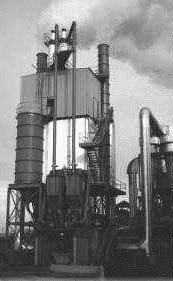No Canadian companies are mentioned here. If you have information on eco-crime in Ontario, feel free to send it to me. Check out a Black Bear post from last month if you are interested in information on Ontario's biggest polluters.
 Du-Kane Asphalt Co., Addison, IL. Du-Kane failed to maintain and operate its pollution control equipment at the company's bituminous asphalt manufacturing plant, causing the plant to exceed the 20 percent limit for opacity. Opacity means the amount of light obscured by visible particles such as smoke, ash and dust, and the plant's emissions were found to be blocking 75-85 percent of the light. An EPA inspector discovered the excessive emissions during a test in October. The test was done in response to a citizen complaint regarding visible emissions from the facility.
Du-Kane Asphalt Co., Addison, IL. Du-Kane failed to maintain and operate its pollution control equipment at the company's bituminous asphalt manufacturing plant, causing the plant to exceed the 20 percent limit for opacity. Opacity means the amount of light obscured by visible particles such as smoke, ash and dust, and the plant's emissions were found to be blocking 75-85 percent of the light. An EPA inspector discovered the excessive emissions during a test in October. The test was done in response to a citizen complaint regarding visible emissions from the facility.Dana Container Inc. Detroit, MI. A $381,730 penalty for violations of federal hazardous waste regulations. Dana's truck container and tank cleaning facilities were cited for violating the federal Resource Conservation and Recovery Act requirements for managing hazardous waste.
Doboy Inc., New Richmond, WI. $52,246 penalty for violation of federal hazardous waste regulations. The company failed to determine, from 2000 to 2004, if waste filters from its wet paint spray booth were hazardous. EPA and the Wisconsin Department of Natural Resources inspected the Doboy package-making facility in March 2004. Its manufacturing process produces paint waste that requires disposal in a hazardous waste facility.
Keystone Steel & Wire Co., Peoria, IL. Keystone failed to apply the best available technology to control increased air pollutant emissions and failed to measure emissions of these pollutants in a timely manner.
Wabash Alloys LLC, Cleveland, OH. $11,160 penalty. Wabash Alloys violated national clean-air emission standards for hazardous air pollutants by failing to comply with requirements for operating its scrap dryer afterburner. Wabash has certified that it is now complying fully with national emission standards for secondary aluminum production facilities.
Domtar Industries Inc., Port Edwards, WI. Domtar violated the Clean Air Act by emitting excessive quantities of methanol from its pulp production process. Short-term exposure to methanol may result in visual problems, such as blurred or dimness of vision, leading to blindness. Long-term exposure may result in conjunctivitis, headache, giddiness, insomnia, gastric disturbances, impaired vision and blindness. Methanol is also a volatile organic compound that contributes to the formation of ground-level ozone or smog.
Continental Tire North America Inc., Bryan, OH. Recent modifications of the plant increased emissions of naphtha, a volatile organic compound. Continental did not apply for a state permit that would require emission controls.
Greif Brothers Corp., Alsip, IL, and H-O-H Chemicals Inc.,Palatine, IL . H-O-H Chemicals supplied and monitored chromium-based corrosion inhibitors for treating water used in the Greif Brothers two industrial cooling towers at the Greif Brothers metal drum production plant in Alsip. This is a violation of national emission standards for hazardous air pollutants. The chemicals used were sodium chromate and sodium dichromate, both hexavalent chromium compounds. Short-term exposure to hexavalent chromium can cause shortness of breath, coughing and wheezing. Long-term exposure can cause perforations and ulcerations of the nasal septum, bronchitis, decreased pulmonary function, pneumonia and other respiratory effects. Hexavalent chromium is also a known carcinogen.
Del's Metal Co., Rock Island, IL. Del's Metal failed to test its sweat furnace emissions for dioxins and furans or to install an afterburner to destroy the dioxins and furans at the company's secondary aluminum production operation. The company did not comply with planning, notification and recordkeeping requirements. Dioxins may cause liver damage and probably cause cancer in humans, while furans also cause cancer.
Lehigh Cement Co., Mitchell, IN. Lehigh failed to maintain cement kiln exhaust gas temperatures at levels that ensure compliance with dioxin and furan emission limits, failed to submit complete emissions reports and failed to comply with limits on opacity or the amount of light obscured by dust emissions.

No comments:
Post a Comment